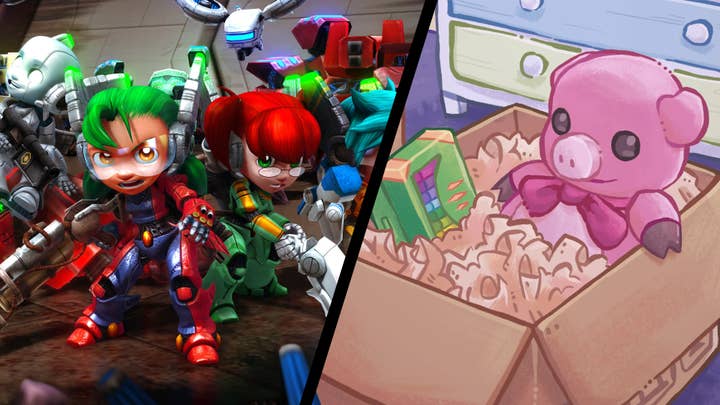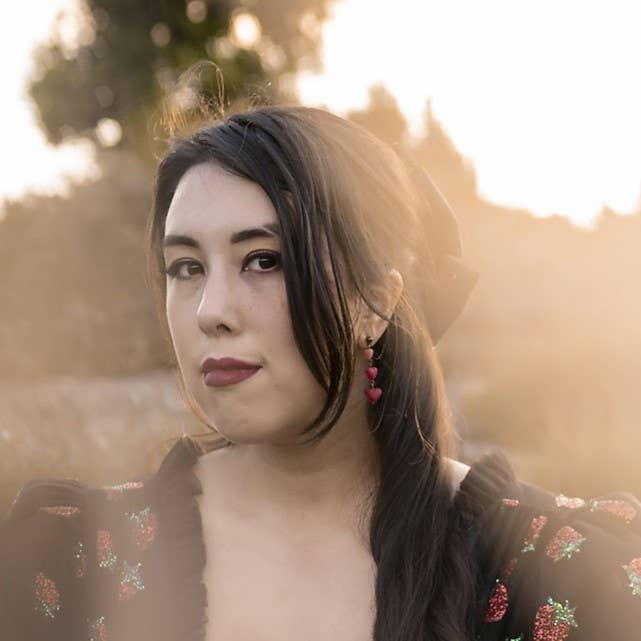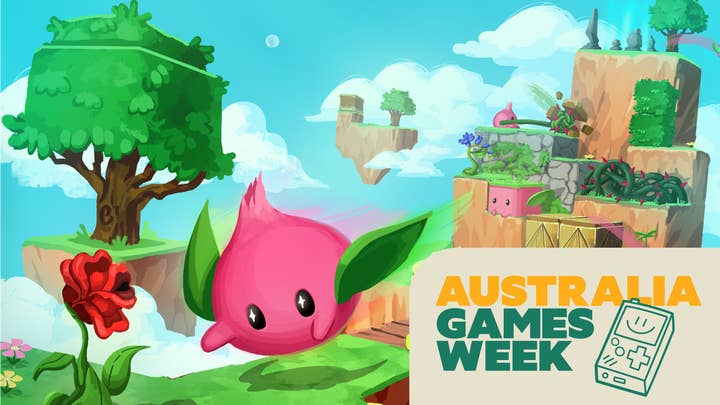Why Witch Beam is staying small after Unpacking’s huge success
Sanatana Mishra and Mei-Li C. talk Tempopo, how Witch Beam's unusual structure favours sustainable game making, and the studio's journey to empower other indies
It was one of 2021's indie hits: Unpacking.
Witch Beam's title won a plethora of awards, featured at a wealth of prestigious conferences, and released successfully on several platforms after its original launch. It was also one of GamesIndustry.biz's very own Games of the Year 2021 (mine).
When asking Witch Beam's co-founder and designer Sanatana Mishra what Unpacking changed for the Brisbane-based studio, he says it's both changed nothing at all, and a lot of things.
"Our studio structure and work process hasn't changed, but it's allowed us to change our lifestyles a lot. For Assault Android Cactus [Witch Beam's previous game], me and Tim [Dawson, co-founder] were often living on less money than a student might have. It's detrimental to your physical health, your mental health… all kinds of things can deteriorate very quickly in that scenario.
"Now we've got a comfortable base to build from. It allows us to feel more confident in hiring other creatives and bringing them in, and giving them a slice of ownership on what we're doing because we don't need to have as much ownership now, we've reached a point where we have a lot of resources. A lot of people when they have success seem to want more and more. I had a little bit of success and realised, 'Oh, isn't this great?' because now I can help other people have some success if there's a lot to go around. I feel like the greed that exists a lot of the time is really weird."
Operating from a place of stability, in a healthy way, is key to Witch Beam's operations. The studio has decided to remain small, doesn't have any full time employees, and aims at empowering its partners and contractors instead of scaling up in a more traditional way.
"We're not business builders. We want to be creative, make a game, and empower our friends"Sanatana Mishra
"There's me, Tim, and Jeff [van Dyck], who founded the company, and then for the last two projects, Tempopo and Unpacking, we brought in partners. Unpacking was Tim and Wren [Brier]'s idea at the core. Wren was a full partner in that project and owner of everything to do with it, but not necessarily in the company because she wants to do her own thing. For that project, she was working on it and then we hired [contractors]. At our peak, there were maybe six people working on the game, I think.
"Generally we'll hire people for part-time roles, and contractors. In the case of Unpacking, it has been so successful we've been able to share some of that success back with them. This is the model that works for us because we want to stay small. We're doing the same thing [with Tempopo]. It's probably the equivalent of four or five full time people working on it, which is a couple of part-time people, and then me full-time, and Tim now moving into working on it full-time too."
Mishra adds that Witch Beam wants to stay in that five-to-six people range, and learnt the hard way the challenges of working on multiple games at once without scaling up, as Tim Dawson had to juggle his work on Unpacking and upcoming title Tempopo.
"Learning that doing two things at once is basically impossible was really useful for us," Mishra says. "A lot of people really want a business. We're not business builders. We want to be creative, make a game, and empower our friends."
He continues: "Our hypothesis is our games are good because we make them, and we like making games, so that should be what we do. Now, we have more money to pay people better, more money to live kind of comfortably, and more money to stay at that level of independence that we want."
Witch Beam decided to work with a publisher for Tempopo, new UK-based label Cult Games. This was a decision that Mishra says wasn't made "out of necessity of funding" as all three of the studio's games were completely self-funded, alongside some governmental support.
"We always want to be self-funded and in control. It's just that if you're going to stay at six people, you know what you can't do as six people? You can't do a marketing campaign. You can't do launch planning and manage localisation teams. Well, you can, but it just means it will take your game two years longer to come out. So I view a publisher as essentially a partner in this."

Mishra says he's really proud of Tempopo's development so far. The rhythm title has stealthily been touring shows for the past year or so, from PAX Australia to BitSummit to SXSW. Mishra actually gave a talk at GCAP this year about interpreting feedback from public demos.
"[We're at] a good point with the game. I sit down and I play it and I think: 'Wow, this is really pleasant, feels great, and plays nicely'. I'm happy with it, [but it] took a long, long, long, long, long time to get there. The development process itself, it's been a challenge, honestly. We did Cactus, and then Unpacking, and then started this in parallel to Unpacking, but with no budget because we put all of our money into Unpacking.
"So there was $0 for this game for a long time. And then we got great support from Screen Queensland and now just recently Screen Australia, which allowed us to ramp things up before Unpacking came out. But it's been a learning process, it's been really difficult for a small team like us to actually tackle."

Witch Beam has a release date in mind for Tempopo but keeps its cards close to its chest for now. When asked what success would look like for the title, Mishra says there's many layers to it.
"The first one is that we release a game at all. That's a success. Finishing a game is incredibly difficult. And the second layer is I'd like that to be really good, [and to be] innately proud of it. We got there with Cactus. That was a great point to reach and I feel pretty confident we're going to do that [with Tempopo].
"And then the next level of success is that you reach a ton of people. It's really nice that we exist in an industry where reaching a ton of people means making a ton of money as well. But I like to think that's the first goal. You can still reach people with your game over a long time, even if it isn't a huge financial success. And then finally, making a bunch of money that you can use to stabilise and improve the lives of the people who made it and help them.
"I would love nothing more than for Tempopo to be so broadly enjoyed that it's successful enough that the people who worked on it who aren't me make money from it, and are able to go and then create the games that they want. We're working with our friends, Disparity Games. They released a game called Ninja Pizza Girl, and they've been doing work with other Queensland-based indies for the last seven or eight years. And they have all these great ideas for another game."

Witch Beam's producer Mei-Li C. adds that she always thinks about Witch Beam's business plan as "essentially to be working with these deeply passionate, talented and lovely people" and being able to support them.
We move on to talk about the indie scene in Brisbane, which Mishra says used to be "the hub for Australian game development for over a decade." A lot of big studios were established in the Queensland city before the global financial crisis, from EA with Pandemic, to THQ, Sega, and Krome, which employed around 300 people there.
"Everything was in Brisbane," Mishra says, echoing what fellow Brisbane developer Prideful Sloth told us. "Every single one of those shut at different points in time as well as a couple of other big ones. Now all that's left [of the big studios] is kind of the weird zombie corpse of Halfbrick, which is an interesting tale in and of itself where [in 2015] they decided they didn't need game designers. And we've got Gameloft. But it's still a really small space in Queensland because everybody left."
Mei-Li notes that a lot of creatives from Brisbane moved to Melbourne, with Victoria being notoriously ahead in terms of games funding for instance, as we highlighted earlier this week as part of our Australia Games Week.
"We all want to be able to encourage other people coming into Brisbane, growing, and being a part of the community here"Mei Li C.
"There are some things still happening," Mei-Li continues. "We still have the Big Dev meets but that's only once a month. That's been going on for a long time and the people that ran it back then are still running it now. The people that love Brisbane and love the scene in Brisbane really want to keep vitalising the scene. That's why I want to stay in Brisbane. I don't want to leave my community behind and we all want to be able to encourage other people coming into Brisbane, growing, and being a part of the community here."
Mishra says Melbourne has a "community of natural support," which is immensely helpful and doesn't necessarily exist in Brisbane.
"If you come to Melbourne now, [you have] options for connecting with game developers of any scale, you'll find kindred spirits. It's embers in other places. We're growing, but you can't just go to Brisbane and be like: 'I'm going to find a AAA group of people to hang out with, and an indie group' and that kind of thing. The range of developers is not as big."
He concludes: "We're still in an interesting place in Australia where nationally the Australian game scene is growing pretty substantially. It's strange that we have like the amount of developers you'd normally get in one major city like London, but we're spread across a land mass the size of America. When everybody gets together, it really is like a big party."
Sign up for the GI Daily here to get the biggest news straight to your inbox

